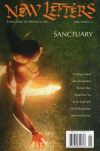New Letters – 2013
To what extent do literature and journalism perform the same work? Editor Robert Stewart prefaces this issue of New Letters with a brief comment that considers the relationship between these separate fields that may not be so separate. Stewart quotes Philip Roth speaking in an installment of American Masters: “There’s a journalistic side to writing novels.” Stewart goes a step further, asserting that “we don’t hear the word journalism often enough in literary discussions . . .” Writers of fiction need “the facts to present the story; literary journalists and memoirists need the story to present the facts.”
To what extent do literature and journalism perform the same work? Editor Robert Stewart prefaces this issue of New Letters with a brief comment that considers the relationship between these separate fields that may not be so separate. Stewart quotes Philip Roth speaking in an installment of American Masters: “There’s a journalistic side to writing novels.” Stewart goes a step further, asserting that “we don’t hear the word journalism often enough in literary discussions . . .” Writers of fiction need “the facts to present the story; literary journalists and memoirists need the story to present the facts.”
This philosophy can be seen in the work Stewart and his editors selected for this issue of New Letters. James McKinley’s “Confessions of an Actual Mad Man” recounts the author’s experience in the advertising industry during the 1960s. McKinley reinforces the television program’s core analysis of the industry. As McKinley puts it, “in the Ad World nothing is gray: All our messages were stark and obvious as embellished truths, prettified lies.” The piece is aptly titled; the author clearly favors confession and description of the milieu over narrative.
Robert Day’s “Barrel Heat” offers a wonderfully slow burn. The first person narrator offers a coming-of-age story that is interspersed with a description of the present-day events that inspire him to tell the tale in the first place. Decades ago, the narrator was a young man who worked for Bob Kincade, a master gunsmith and former champion trap shooter. The narrator learns the ins and outs of the hobby from Kincade during that crucial time in which a boy learns the kind of man he will become. Although the narrator becomes a creative writing teacher, he resembles the other characters he describes; they all have a deep well of emotion, but seldom express those feelings overtly.
Another highlight of the issue is Angela Elam’s interview with Valzhyna Mort, a poet who has made quite a name for herself at a comparatively young age. Elam is a good interviewer; her brief responses put the spotlight on Mort, but she isn’t afraid to ask perceptive and in-depth questions. Of particular note is Mort’s discussion of one of the issues that is raised when poems cross borders. One of her poems refers to “white apples,” a common Eastern Europe variety. In Europe, no one “perceives them as a poetic metaphor in any way. In English, however, nobody takes white apples literally. Everybody assumes that it has to be primarily a metaphor.”
Those who have been fortunate enough to teach a writing workshop understand the powerful emotions that are often at play. Students come to class having poured their hearts and souls into their work, sometimes coming from an emotional place. Maxine Kumin’s poem, “The Day My Student Teaches Me That Life Is Not Art” is simple, short and powerful. A student has brought a very personal poem describing the night a man assaulted her in bed. Kumin beautifully describes a feeling that I suspect is shared by many teachers. Although a teacher must evaluate and discuss works with a critical eye, they also sometimes wish to comfort their student in the same manner as a best friend.
While some of the work in this issue of leans toward the traditional, other pieces experiment more seriously with form and language. In all, New Letters offers work that will appeal to nearly any taste.
[www.newletters.org]





